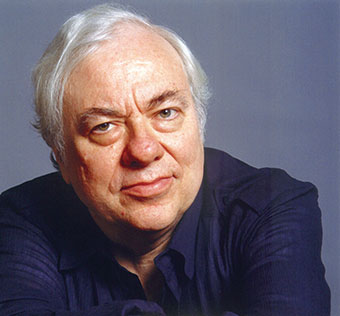Goode? Absolutely Great!
by Jan Jezioro

Pianist Robert Goode makes a very welcome return to Buffalo
In a few rare instances, a classical pianist earns from his peers what must be considered the highest possible accolade, and he or she is described as a pianist’s pianist. Richard Goode, who has earned this distinction, is returning to town on Friday, March 2, at 7:30pm, for a solo recital as part of the Ramsi P. Tick Concert Series. And, for the first time, an event produced by the Tick series, usually at home in the Flickinger Center at the Nichols School in Buffalo, will instead take place in Slee Hall, on the UB Amherst Campus.
Phil Rehard, concert manager at Slee Hall, also serves as the artistic director of the RP Tick series, and that put him in the perfect position to explore the possibility of producing a joint venture by UB and the Tick series. “David Felder, professor of composition in the UB Department of Music, also serves as the Chairman of the UB Concert Committee, so we have been talking about collaboration between the two organizations for a few years,” Rehard explains. “The Richard Goode concert seemed like just the right event for the two organizations to co-present. It was difficult to decide on the venue for this year’s collaboration, but we decided on Slee for the sake of the UB students that will want to attend. In fairness, though, the next collaboration would need to take place at the home of the Tick series, at the Nichols School.”
Goode earned his early reputation as a performer of chamber music, notably at the Spoleto Festival, and as one of the founding members of the Chamber Music Society of Lincoln Center. A relatively late bloomer as a soloist, both with orchestra and on the recital stage, he is best known for his uniquely personal interpretations of Beethoven’s complete concertos and sonatas for piano, all of which he has recorded, as well as for his Schubert and Mozart interpretations. Goode’s recording with clarinetist Richard Stoltzman of the Brahms Sonatas for clarinet and piano, received a Grammy.
Goode’s wide-ranging program includes Robert Schumann’s lyrically autobiographical Kinderszenen, Op. 15 (Scenes From Childhood), as well a late work by Johannes Brahms, the 1892 Fantaisies, Op. 116. For the second half of the evening, Goode has decided to make it an all Chopin affair, with the Nocturne in E-flat, Op. 55, No. 2, the Scherzo No. 3 in C-sharp Minor, Op. 39, and the Ballade No. 3 in A-flat Major, Op. 47, along with a selection of waltzes.
Richard Goode will also present a Master Class on Wednesday, February 29 at 2:30pm in Baird Recital Hall that is free and open to the public for observation.
Tickets are $30 general admission, $20 for UB faculty/staff/alumni and senior citizens, and $15 for students. For tickets and more information, call 645-2921 or visit www.slee.buffalo.edu.
Robert Silverman Plays Liszt at Brock
Whenever you have to make a hard choice between two events occurring at the same time on the same day, it seems that you rarely forget the occasion, even years later. Vancouver-based Robert Silverman, dean of Canadian pianists, is presenting a lecture/performance on Friday, March 2 at 7:30pm, in the Sean O’Sullivan Theatre at Brock University in St. Catharines. Silverman is well known in the Niagara Peninsula and in Western New York, through his many appearances as a guest artist at the summer Music Niagara festival just across the border in Niagara-on-the-Lake.
Anyone who attended Silverman’s last appearance at Brock, a couple of years ago, when he offered a similar lecture/performance centered on Mussorgsky’s Pictures at an Exhibition, will not want to miss his discussion of Liszt’s “Musical Postcards,” and his performance of Liszt’s Sonata in B Minor, of which he says: “If one examines the score, the similarities between the Liszt Sonata and a Wagner opera with its own leading motifs are striking. The piece could in a sense be viewed as a brief, unstaged Wagnerian opera, but without singers or a plot. That has not stopped several scholars and critics with ‘time on their hands,’ as Liszt biographer Alan Walker puts it, from attempting to provide various ‘interpretations’ of this work. Some have found in it the Faust legend; others relate it to Milton’s Paradise Lost or the Fall of Man. However, Liszt, no stranger to picturesque titles and poetic references, and for that matter, the Faust legend, chose simply to entitle this work Sonata, and provided no further explanation. He knew best. None are necessary.”
As for the musical “postcards,” Silverman explains, “They are nothing other than the Annees de Pelerinage and the earlier Album d’un Voyager, all pieces Liszt composed, inspired by natural scenes and artwork he saw, and poetry/prose he read, while touring Italy and Switzerland.”
The event is free. For more information, visit www.brocku.ca.
blog comments powered by Disqus|
Issue Navigation> Issue Index > v11n8 (Week of Thursday, February 23) > Goode? Absolutely Great! This Week's Issue • Artvoice Daily • Artvoice TV • Events Calendar • Classifieds |









 Current Issue
Current Issue